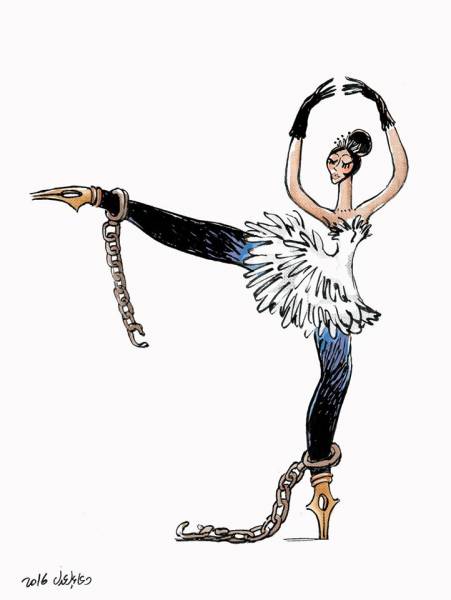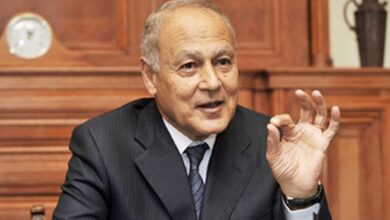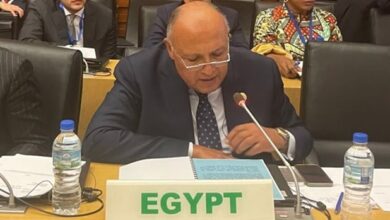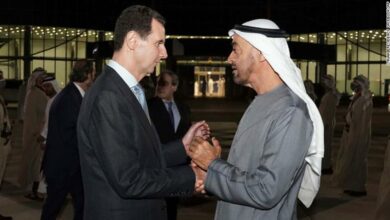
It is not an exaggeration if I say that since the beginning of March, all my conversations and talks with family, friends, or colleagues were on one topic: the Woman.
A female friend laughed, interrupting our serious discussion to share a funny story with an employee of the gym she goes to. The girl unexpectedly asked her: “How can I become a feminist like you?” “What made you think I am a feminist?” my friend responded. “You look like one,” the girl said.
We cracked laughing, yet various questions came to our minds, which is exactly what our friend wanted from her story.
Despite the countless creative women in arts, literature, and cinema who have covered extensively, through their work, women’s rights and the inequality of equality, the concept of “Arab feminism” had yet to materialize and reach a consensus in the Arab world; where the unified framework reference for those who describe themselves as feminists is absent. However, social media is now providing feminists with a platform to express themselves, all the ideas they adopt in revolt against all the customs and roles that are preset for women, as well as, their form, appearance, and dress.
That said, “feminism” raises a great deal of uproar and ongoing debate on social media among those who think that feminism has its right issues on the one hand and those who accuse it of being a mere “Foreign” idea that is imported into the Arab world, and an unenlightened attempt to interpret the feminist experience in the advanced liberal countries, on the other.
This is not surprising, given that the women’s rights issue, this feminism, is not limited, in its implications, to gender equality only, but also goes beyond it to identity, ideology, power, politics, and the formulation of legal and social changes. Feminism, ultimately, is a means to an end; it is a movement catalyst for change, and to create women empowering mentality at the Arab and global levels.
Hence, it is impossible to reduce the Arab feminist experience to just an imported or quoted idea, rather, it is an authentic experience that not only confronted the conservative Arab patriarchal society but also the Western Orientalist view that assumes that women in Muslim-majority societies are always marginalized, and the means of Western media portraying Arab women as victims, oppressed and submissive, in general.
The Arab women’s awareness arose and developed early in conjunction with national consciousness, in the late nineteenth century. Arab Feminism, with its weaknesses, is a local product of Arab political, social, and economic dynamics. Consequently, this movement must be liberated from the burden of colonial and Orientalist accumulations that were placed upon. Everyone, Arabs and Westerners, must understand that Arab women’s need for positive change is neither more nor less than the need of women anywhere else.
In contrast, the Arab feminist movement, in its endeavor to crystallize first, and to achieve equality second, must not draw towards radicalization i.e. anti “Arab man” and attempt to “win” over him as an oppressive, as if all men are in a position of authority, legislation and decision-making, Consequently, losing a partner and an ally in the battle against poverty, oppression and marginalization that both men and women suffer in many of our Arab countries, especially those that remain without peace, stability, and, humans’ construct, both men and women.
We across the Arab countries stand today at a historical juncture; either we choose to continue our wars or the interests of our peoples and future generations. Those who possess sufficient awareness to adopt the second must realize, at the same time, that gender equality based on citizenship is essential, as Arab women, especially in countries suffering from wars, are the path to salvation and advancement, just as American women following the First World War, for example, whom the American writer Lettie Gavi, shared their experience was shared in her book “American Women in World War I“, saying: “The war, in fact, marked the beginning of a new era in the history, where women were freed of outdated traditions and old stereotypes, and laid the foundation for raising wages, providing better jobs and improvement of working conditions
The roles of German women after World War II are also considered an important example of what women can do. They participated, just like in the war, in rebuilding and reparation for what was destroyed. Women, who outnumbered men by several million, worked as volunteers to remove remnants of war and reconstruction, they also have been largely involved in the workforce, bearing the burdens of families and securing income, which formed the basis for their future liberation, and the pillar and cornerstone of German’s “economic miracle”.
Women have proven that they are irreplaceable, especially in post-crisis stages and in building a post-war economy. They have proven that empowering women and employing their capabilities is a necessity and not a luxury As for our Arab societies, the two above-mentioned experiences, and many other feminist experiences, are an example that should be followed so that our countries do not miss a tremendous opportunity that lies in the ability, energy, and enthusiasm of Arab women to prove themselves on the one hand and to boost the national economy and bring about change and construction in our societies on the other.
Therefore, feminism, for our Arab countries, is neither an intellectual luxury nor a “fashion”, a “trend” or a specific quote that some share on their social media. Indeed, women’s empowerment is a need and a major demand that will change a lot in our societies for the better. Our nation needs the contributions of its entire people without exception.
And if the man, as a result of his protection and production tasks, has historically gained social power, there is a generation of Arab women all over the Arab world that has grown up with more opportunities, freedom, and cultural reform. Here the man must not get confused or oppose, but on the contrary, he must be supportive and encouraging, as there will be someone who would share the work and carry the burden with.
In conclusion, let me say that equality or women’s empowerment is not just a small feminist association or a “Facebook” group, nor is it even a “formal quota” in parliaments. Rather, the feminist movement is a process in which the political, societal, economic, and academic intertwine. Perhaps, studies of women and gender in our Arab universities have yet to lay down guidelines or a clear direction to what we want “feminism” to be in our region, yet, Arab women are moving forward and will not stop.
Finally, to the Arab woman, with all her splendor, sacrifice, and determination, we send our heartfelt love and appreciation, and not only in March but all year-round.




